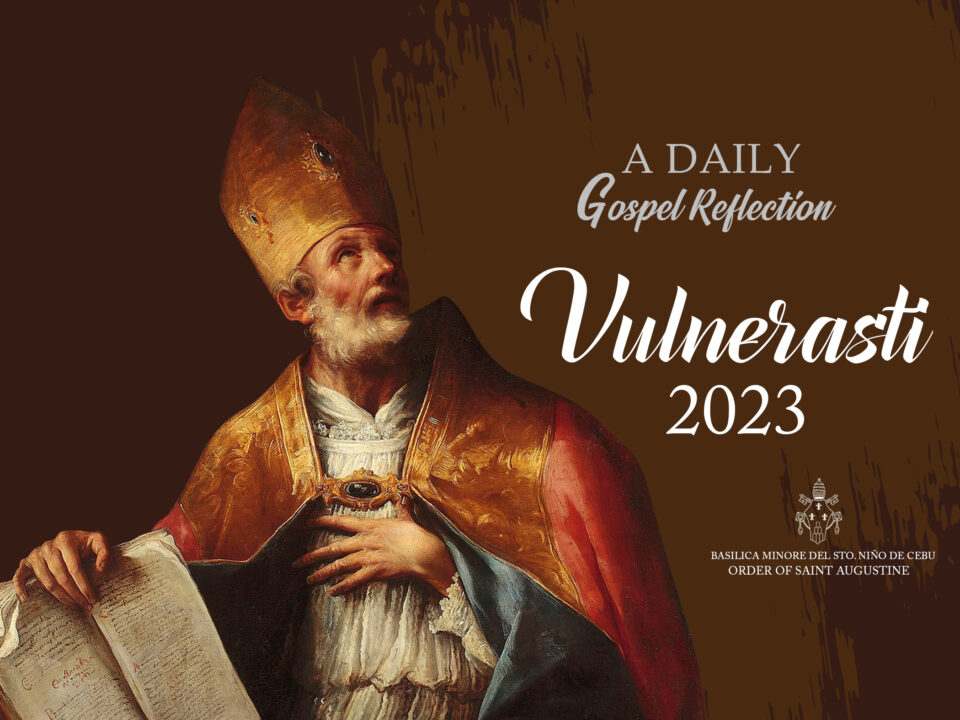Twenty-sixth Sunday in Ordinary Time

Today’s Reflection
Gospel: Lk 16:19-31
September 25, 2022 | Sunday
Once there was a rich man who dressed in purple and fine linen and feasted every day. At his gate lay Lazarus, a poor man covered with sores, who longed to eat just the scraps falling from the rich man’s table. Even dogs used to come and lick his sores. It happened that the poor man died, and angels carried him to take his place with Abraham. The rich man also died, and was buried. From the netherworld where he was in torment, the rich man looked up and saw Abraham afar off, and with him Lazarus at rest.
He called out, ‘Father Abraham, have pity on me, and send Lazarus, with the tip of his finger dipped in water, to cool my tongue, for I suffer so much in this fire!’
Abraham replied, ‘My son, remember that in your lifetime you were well-off, while the lot of Lazarus was misfortune. Now he is in comfort, and you are in agony. But that is not all. Between your place and ours a great chasm has been fixed, so that no one can cross over from here to you, or from your side to us.’
The rich man implored once more, ‘Then I beg you, Father Abraham, send Lazarus to my father’s house, where my five brothers live. Let him warn them, so that they may not end up in this place of torment.’ Abraham replied, ‘They have Moses and the prophets. Let them listen to them.’ But the rich man said, ‘No, Father Abraham; but if someone from the dead goes to them, they will repent.’
Abraham said, ‘If they will not listen to Moses and the prophets, they will not be convinced, even if someone rises from the dead.’”
Today’s Reflection:
The Parable of the Rich Man and Lazarus concerns more about the rich man who lives a life of callous extravagance and ignores the starving Lazarus at his gate. Their lots are reversed in the afterlife. Tormented in Hades, the rich man requests that Abraham sends Lazarus to his five brothers lest they too end up in a place of torment. Abraham rejects his plea arguing that they already have Moses and the prophets to whom they should listen.
That Abraham recommends listening to Moses and prophets suggests that the rich man—like his brothers—disobeyed or did not do their teachings. One of these is the teaching of the Prophet Amos (c. 760 BCE) that the leaders of God’s people should promote justice, much more in the face of massive inequality and oppression (Am 3:10). They are tasked “to establish justice in the gate” (Am 5:15), but they instead “push aside the needy in the gate” (Am 5:12). The First Reading recounts that Amos castigates those who felt comfortable and lived luxuriously in Zion and Samaria without getting bothered at the ruin and impoverishment of Joseph. Zion was then another name for Jerusalem—the capital of the Southern Kingdom of Judah, and Samaria was the capital of the Northern Kingdom of Israel. Both represented the few elite rulers. Joseph, on the other hand, was a representation of the great majority who were impoverished and marginalized. Since the leaders remained apathetic to the affliction and suffering of the great majority of the people, they would soon be exiled as a punishment.
The fact that the rich man is dressed in purple and fine linen (Lk 16:19) intimates that he was a Jewish leader who was well connected to the Roman authorities who usually donned purple clothes. He enriched himself by collaborating with the Romans at the expense of his people. Most of the latter suffered the fate of Lazarus who died of starvation while begging at the rich man’s gate. Herein lies the guilt of the rich man. He did not only fail to render justice to Lazarus at his gate, but he also took the lion’s share of the limited goods of the society resulting in the impoverishment of many. He was not only indifferent to the many who were poor (represented by Lazarus) but also stole what rightfully belonged to them.
Amos’ strongly worded critiques and exhortations find some striking resonance in the passionately delivered appeal of a sixteen-year old climate activist named Greta Thunberg to the leaders of some rich countries. She warns of some catastrophic effects of global warming in the near future unless these countries seriously take concrete actions. These include reducing their carbon emissions and helping preserve the world’s remaining rainforests. On 23 September 2019, she told world leaders at the UN climate action summit in New York: “You have stolen my dreams and my childhood with your empty words.” Said with passion and utter conviction, her words caught headlines and inspired discussions worldwide.
There have been glimmers of optimism as more and more young people take part in demonstrations against economic policies that bring about global warming. More and more governments and non-governmental organizations express willingness to allocate some funds for environmental care. But it remains to be seen whether the world leaders—the present-day rich man—who have greater clouts truly listen to Thunberg, that is, implement concrete measures that will significantly lower their carbon emissions. But we must do our share however little its effect may be. We can at least live an eco-friendly lifestyle, which in itself is a form of listening to our Mother Earth, an act of listening to God. (by Fr. Lazaro N. Ervite, OSA) /Vulnerasti, 2022



